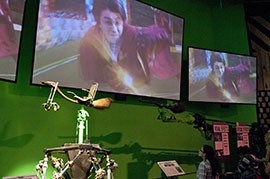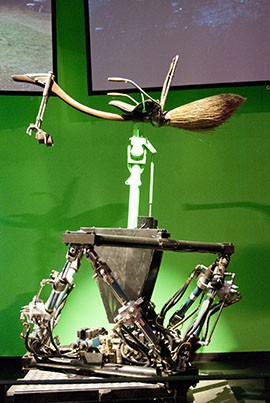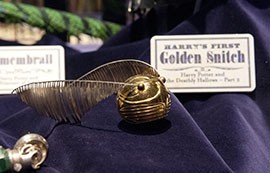Cronkite News has moved to a new home at cronkitenews.azpbs.org. Use this site to search archives from 2011 to May 2015. You can search the new site for current stories.
Quidditch adapted into real world looks to become Olympic sport
LONDON – Bubbling with excitement, devotees of Harry Potter enter Warner Bros. Studio Tour London-The Making of Harry Potter with a sharp warning: You’ll never look at quidditch the same way.
For some fans around the world, that’s exactly what they want.
All across the U.S. and in other parts of the world, Harry Potter supporters have adapted the beloved sport to the non-magical world. Reminiscent of soccer but played on broomsticks, quidditch debuted in “Harry Potter and the Philosopher’s Stone.”
Increased respect and visibility for the game have given confidence to players across the globe to set their sights on quidditch becoming a part of the magnum opus of sports: the Summer Olympics.
A few weeks before to the games, the International Quidditch Association organized an expo match in London, outside Olympic Park, with four countries participating. The U.S. shut out every team to snatch the “gold medal.”
Marcus Gold, a senior at Arizona State University who visited Warner Bros. Studio to see the quidditch exhibit, thought the idea of it becoming official at the games sounded plausible.
“It makes sense with the popularity of quidditch,” he said. “I mean, we have synchronized swimming in the Olympics. Why can’t we have quidditch?”
Alexis Bristor agreed.
“I think once people saw it and realized what a difficult, fast-paced, hard-hitting and skill-requiring sport it is, they’ll come around,” Bristor said.
At ASU, athletes first took to their broomsticks in 2009, when Bristor and her dorm mates founded a team. In the U.S. alone there are 600 quidditch teams in high schools and colleges.
“The real difference, obviously, is that we can’t use magic,” Bristor said. “There are several workarounds for that fact that, in my opinion, make the game all that much better.”
In the books, the sport’s equipment includes a quaffle, bludgers and the golden snitch. The ultimate goal is to score points through ringed hoops with the quaffle while simultaneously avoiding bludgers enchanted to send players plummeting to the earth.
Chasers, beaters, keepers and seekers round out the positions available for play. Chasers make goals while beaters protect them from bludgers. A keeper, essentially a goalie, blocks quaffles from entering a team’s rings. The coveted golden snitch zooms at ultra-high speeds through the teams and offers a handsome 150 points and end to the game for the seeker who catches it.
“Obviously we don’t have demonic balls that fly around trying to knock people off their brooms, so we use dodgeballs,” Bristor said.
The beaters throw dodgeballs at the other team’s players. If a player is hit, he or she is required to immediately drop any ball, dismount and run and touch the hoops before re-entering.
“You can imagine that really adds a chaotic element as well as unpredictability,” Bristor said.
And while it may seem like bedlam at points to players, onlookers have mixed emotions. Bristor said many don’t consider it a real sport. To that, she simply extends an offer to witness the game.
“Generally speaking they’ve never seen the game played and once they have, they have nothing but respect,” she said. “That’s actually how we’ve gained several key players.”









